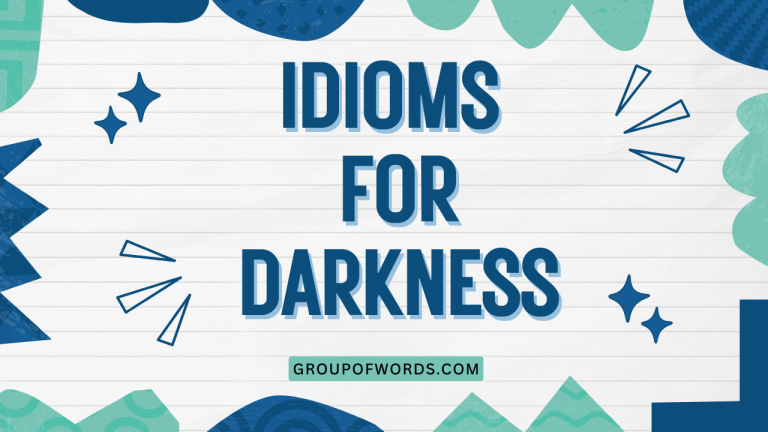Idioms About People: Understanding Common Expressions
Idioms are colorful expressions that add vibrancy and nuance to the English language. Understanding idioms, especially those related to people, is crucial for effective communication and comprehension.
These idioms often carry cultural context and can significantly enhance your ability to understand native speakers and written texts. This article will delve into the world of idioms about people, providing clear definitions, examples, usage rules, and practice exercises to help you master their meaning and appropriate application.
This comprehensive guide is designed for English language learners of all levels, from beginners to advanced speakers, and anyone looking to enrich their understanding of English.
Table of Contents
- Introduction
- Definition of Idioms About People
- Structural Breakdown
- Types and Categories of Idioms About People
- Examples of Idioms About People
- Usage Rules for Idioms About People
- Common Mistakes When Using Idioms About People
- Practice Exercises
- Advanced Topics
- Frequently Asked Questions
- Conclusion
Definition of Idioms About People
An idiom is a phrase or expression whose meaning cannot be understood from the ordinary meanings of the words it contains. In other words, it’s a figurative expression.
Idioms about people are phrases that describe a person’s characteristics, behavior, skills, relationships, or social standing in a non-literal way. These idioms often rely on metaphors, similes, or cultural references to convey their meaning.
They are a crucial part of everyday English and are essential for understanding spoken and written communication. Recognizing and correctly using these idioms will greatly improve your fluency and comprehension.
The function of idioms about people is to add color and expressiveness to language. They allow speakers and writers to convey complex ideas or emotions in a concise and memorable way.
For example, instead of saying someone is very stubborn, you might say they are “as stubborn as a mule.” This idiom not only conveys the person’s stubbornness but also adds a layer of imagery and emphasis. Idioms are used in various contexts, including casual conversations, formal writing, and professional settings.
However, it’s important to be mindful of the audience and the formality of the situation when using idioms, as some may be considered informal or inappropriate in certain contexts.
Structural Breakdown
The structure of idioms about people can vary significantly. Some idioms are simple phrases consisting of a few words, while others are more complex clauses or sentences.
Many idioms contain verbs, nouns, adjectives, and prepositions. Understanding the grammatical structure of an idiom can help you recognize it and interpret its meaning.
Here are some common structural elements found in idioms about people:
- Similes: Many idioms use similes, which compare one thing to another using “like” or “as.” For example, “as cool as a cucumber” compares someone’s composure to the coolness of a cucumber.
- Metaphors: Metaphors are another common structural element. They involve a direct comparison where one thing is said to be another. For instance, “a wolf in sheep’s clothing” describes someone who appears harmless but is actually dangerous.
- Fixed Phrases: Some idioms are fixed phrases, meaning the words cannot be changed without altering the meaning or making the idiom nonsensical. For example, you can’t change “a couch potato” to “a chair potato” and retain the same meaning.
- Verb + Preposition: Many idioms consist of a verb followed by a preposition, such as “look up to” (respect) or “get along with” (have a good relationship with).
Types and Categories of Idioms About People
Idioms about people can be categorized based on the aspect of a person they describe. Here are some common categories:
Idioms Describing Personality
These idioms describe a person’s character traits and general disposition. Examples include “a people person,” “a busybody,” and “a cold fish.”
Idioms Describing Behavior
These idioms describe how a person acts in specific situations or their general conduct. Examples include “a backseat driver,” “a go-getter,” and “a yes-man.”
Idioms Describing Skills and Abilities
These idioms describe a person’s talents, aptitudes, or lack thereof. Examples include “a whiz kid,” “a jack-of-all-trades,” and “all thumbs.”
Idioms Describing Relationships
These idioms describe how a person interacts with others and the nature of their connections. Examples include “thick as thieves,” “an old flame,” and “a fair-weather friend.”
Idioms Describing Social Status and Reputation
These idioms describe a person’s position in society, their reputation, or their influence. Examples include “a big shot,” “a rising star,” and “a has-been.”
Examples of Idioms About People
The following tables provide extensive examples of idioms about people, organized by category. Each example includes the idiom, its meaning, and a sample sentence.
Personality Examples
This table provides examples of idioms that describe various personality traits. Understanding these idioms can enhance your ability to describe individuals in a more nuanced and expressive way.
| Idiom | Meaning | Example Sentence |
|---|---|---|
| A people person | Someone who enjoys and is good at interacting with others. | She’s a real people person; she always makes everyone feel comfortable. |
| A busybody | Someone who interferes in other people’s affairs. | Our neighbor is such a busybody; she always wants to know everything about everyone. |
| A cold fish | Someone who is unemotional and unfriendly. | He’s a bit of a cold fish; he never shows any emotion. |
| A chatterbox | Someone who talks a lot. | Sarah is a chatterbox; she can talk for hours without stopping. |
| A daydreamer | Someone who spends a lot of time imagining things. | He’s such a daydreamer; he’s always lost in his thoughts. |
| A goody-two-shoes | Someone who always tries to appear perfect and obedient. | She’s such a goody-two-shoes; she always follows the rules. |
| A rolling stone | Someone who doesn’t settle down in one place or job. | He’s a rolling stone; he’s moved to a new city every year. |
| A tough cookie | Someone who is strong and resilient. | She’s a tough cookie; she’s been through a lot but she’s still going strong. |
| A wet blanket | Someone who spoils other people’s fun. | Don’t be such a wet blanket; let’s just enjoy the party. |
| A shrinking violet | Someone who is shy and timid. | She’s a shrinking violet; she doesn’t like to be the center of attention. |
| A know-it-all | Someone who acts as if they know everything. | He’s such a know-it-all; he always has to correct everyone. |
| A bright spark | A clever or intelligent person. | She’s a bright spark; she always comes up with great ideas. |
| An early bird | Someone who gets up early in the morning. | He’s an early bird; he’s always up before sunrise. |
| A night owl | Someone who stays up late at night. | She’s a night owl; she prefers to work late into the night. |
| A creature of habit | Someone who likes to do the same things at the same time. | He’s a creature of habit; he always has the same breakfast every morning. |
| A heart of gold | Someone who is very kind and generous. | She has a heart of gold; she’s always helping others. |
| A soft touch | Someone who is easily persuaded to give money or help. | He’s a soft touch; he always donates to charity. |
| A live wire | Someone who is full of energy and enthusiasm. | She’s a live wire; she’s always excited about everything. |
| A lone wolf | Someone who prefers to be alone and independent. | He’s a lone wolf; he prefers to work on his own. |
| A drama queen | Someone who overreacts to situations. | She’s such a drama queen; she always makes a big deal out of everything. |
| A control freak | Someone who tries to control everything and everyone. | He’s a control freak; he always has to be in charge. |
Behavior Examples
This table provides examples of idioms that describe different types of behavior. These idioms can help you express how someone acts in specific situations or their general conduct.
| Idiom | Meaning | Example Sentence |
|---|---|---|
| A backseat driver | Someone who gives unwanted advice or instructions. | My brother is such a backseat driver; he always tells me how to drive. |
| A go-getter | Someone who is ambitious and proactive. | She’s a real go-getter; she’s always looking for new opportunities. |
| A yes-man | Someone who always agrees with their superior. | He’s a yes-man; he never disagrees with the boss. |
| A mover and shaker | Someone who is influential and gets things done. | She’s a mover and shaker in the industry; everyone listens to her. |
| A pain in the neck | Someone who is annoying or troublesome. | He’s such a pain in the neck; he always causes problems. |
| A wolf in sheep’s clothing | Someone who appears harmless but is actually dangerous. | He seemed friendly at first, but he turned out to be a wolf in sheep’s clothing. |
| A loose cannon | Someone who is unpredictable and uncontrollable. | He’s a loose cannon; you never know what he’s going to do next. |
| A fair-weather friend | Someone who is only a friend when things are going well. | He’s a fair-weather friend; he disappeared when I needed help. |
| A shoulder to cry on | Someone who provides comfort and support. | She’s always been a shoulder to cry on for me. |
| A bad egg | A dishonest or unreliable person. | He’s a bad egg; I wouldn’t trust him with anything. |
| A dark horse | Someone who surprises others by achieving unexpected success. | He was a dark horse in the competition, but he ended up winning. |
| A people pleaser | Someone who constantly seeks the approval of others. | She’s a people pleaser; she always tries to make everyone happy. |
| A rule breaker | Someone who often disobeys rules or laws. | He’s a rule breaker; he never follows the instructions. |
| A copycat | Someone who imitates others. | She’s a copycat; she always copies my ideas. |
| A pushover | Someone who is easily influenced or taken advantage of. | He’s a pushover; people always get him to do things he doesn’t want to do. |
| A troublemaker | Someone who causes problems or difficulties. | He’s a troublemaker; he always gets into fights. |
| A show-off | Someone who tries to impress others with their abilities or possessions. | He’s such a show-off; he always brags about his achievements. |
| A gossipmonger | Someone who spreads rumors and gossip. | She’s a gossipmonger; she loves to talk about other people’s lives. |
| A know-it-all | Someone who acts as if they know everything. | He’s such a know-it-all; he always has to correct everyone. |
| A blabbermouth | Someone who talks too much and reveals secrets. | Don’t tell her anything important, she’s a blabbermouth. |
| A slacker | Someone who avoids work or effort. | He’s such a slacker; he never does his share of the work. |
Skills and Abilities Examples
This table provides examples of idioms that describe a person’s skills and abilities, or lack thereof. These idioms can help you express someone’s talents and aptitudes in a more colorful way.
| Idiom | Meaning | Example Sentence |
|---|---|---|
| A whiz kid | Someone who is exceptionally talented or intelligent at a young age. | She’s a whiz kid; she graduated from college at the age of 19. |
| A jack-of-all-trades | Someone who has many different skills but is not necessarily an expert in any of them. | He’s a jack-of-all-trades; he can fix anything around the house. |
| All thumbs | Clumsy and awkward, especially with one’s hands. | I’m all thumbs when it comes to knitting. |
| A bright spark | A clever or intelligent person. | She’s a bright spark; she always comes up with innovative solutions. |
| A quick study | Someone who learns quickly and easily. | He’s a quick study; he picked up the new software in no time. |
| A natural | Someone who is naturally good at something. | She’s a natural at playing the piano. |
| A dab hand | Someone who is skilled or proficient at something. | He’s a dab hand at cooking; he makes the most delicious meals. |
| A greenhorn | Someone who is new to a particular activity or field and lacks experience. | He’s a greenhorn in the world of finance. |
| A smooth operator | Someone who is skilled at persuading or charming others. | He’s a smooth operator; he can always get what he wants. |
| A wordsmith | A skilled writer or speaker. | She’s a true wordsmith; her writing is captivating. |
| A computer buff | Someone who is very knowledgeable about computers. | He’s a computer buff; he can fix any computer problem. |
| A math whiz | Someone who is very good at mathematics. | She’s a math whiz; she always gets perfect scores on her math tests. |
| A techie | Someone who is skilled in technology. | He’s a techie; he knows everything about the latest gadgets. |
| A bookworm | Someone who spends a great deal of time reading. | She’s a bookworm; she always has her nose in a book. |
| A master of disguise | Someone who is very good at changing their appearance. | He’s a master of disguise; no one can recognize him. |
| A seasoned professional | Someone with a lot of experience in their field. | He’s a seasoned professional; he’s worked in this industry for over 20 years. |
| A one-trick pony | Someone who is only good at one thing. | He’s a one-trick pony; he can only do one type of task. |
| A keen eye | Having a good sense of observation. | She has a keen eye for detail, catching errors others miss. |
| A good ear | Having a good sense for music or language. | He has a good ear for languages, picking them up quickly. |
| Born with a silver spoon in their mouth | Born into wealth and privilege. | He was born with a silver spoon in his mouth, never having to worry about money. |
Relationships Examples
This table provides examples of idioms that describe different types of relationships between people. These idioms can help you express the nature of connections between individuals.
| Idiom | Meaning | Example Sentence |
|---|---|---|
| Thick as thieves | Very close friends who share secrets and experiences. | They’re thick as thieves; they’ve been best friends since childhood. |
| An old flame | A former romantic partner. | I ran into an old flame at the grocery store yesterday. |
| A fair-weather friend | Someone who is only a friend when things are going well. | He’s a fair-weather friend; he disappeared when I needed help. |
| A shoulder to cry on | Someone who provides comfort and support. | She’s always been a shoulder to cry on for me. |
| Joined at the hip | Extremely close and inseparable. | They’re joined at the hip; they do everything together. |
| Like two peas in a pod | Very similar in personality or appearance. | They’re like two peas in a pod; they have the same sense of humor. |
| On the same wavelength | Having a similar understanding or way of thinking. | We’re on the same wavelength; we always agree on things. |
| At loggerheads | In a state of disagreement or conflict. | They’re always at loggerheads; they can never agree on anything. |
| A match made in heaven | A perfect pairing or relationship. | They’re a match made in heaven; they complement each other perfectly. |
| A relationship on the rocks | A relationship that is experiencing difficulties. | Their relationship is on the rocks; they’ve been arguing a lot lately. |
| To get on like a house on fire | To quickly become good friends. | They got on like a house on fire when they first met. |
| To bury the hatchet | To make peace after a conflict. | They decided to bury the hatchet and move on. |
| To see eye to eye | To agree with someone. | We don’t always see eye to eye, but we respect each other’s opinions. |
| To have a soft spot for someone | To have a particular fondness for someone. | He’s always had a soft spot for her. |
| To rub someone the wrong way | To annoy or irritate someone. | He always rubs me the wrong way with his arrogant attitude. |
| To get someone’s goat | To annoy or irritate someone. | He really gets my goat when he interrupts me. |
| To stab someone in the back | To betray someone’s trust. | I can’t believe he stabbed me in the back by revealing my secrets. |
| To twist the knife | To make someone feel worse by reminding them of their pain. | He didn’t need to twist the knife by mentioning my failure. |
| To wear the trousers | To be the dominant person in a relationship. | She wears the trousers in their relationship. |
| To be at each other’s throats | To argue or fight constantly. | They’re always at each other’s throats. |
| Birds of a feather flock together | People with similar interests or qualities tend to associate with each other. | Birds of a feather flock together, which is why all the athletes hang out together. |
Social Status and Reputation Examples
This table provides examples of idioms that describe a person’s social status, reputation, or influence. These idioms can help you express someone’s position in society in a more descriptive way.
| Idiom | Meaning | Example Sentence |
|---|---|---|
| A big shot | An important or influential person. | He’s a big shot in the company; everyone respects him. |
| A rising star | Someone who is quickly gaining popularity or success. | She’s a rising star in the music industry. |
| A has-been | Someone who was once famous or successful but is no longer. | He’s a has-been; he hasn’t had a hit song in years. |
| A man of the people | Someone who is relatable and understands the concerns of ordinary people. | He’s a man of the people; he listens to everyone’s problems. |
| A pillar of the community | Someone who is highly respected and plays an important role in their community. | She’s a pillar of the community; she volunteers her time to help others. |
| A mover and shaker | Someone who is influential and gets things done. | She’s a mover and shaker in the industry; everyone listens to her. |
| A social butterfly | Someone who is very social and enjoys attending parties and events. | She’s a social butterfly; she knows everyone in town. |
| A gatekeeper | Someone who controls access to something. | He’s the gatekeeper to the industry; you have to go through him to get anywhere. |
| A trendsetter | Someone who starts new trends. | She’s a trendsetter; everyone copies her style. |
| A trailblazer | Someone who is a pioneer in a particular field. | She’s a trailblazer in the field of science. |
| A dark horse | Someone who surprises others by achieving unexpected success. | He was a dark horse in the election, but he ended up winning. |
| A legend in their own time | Someone who is widely admired and respected. | He’s a legend in his own time; everyone knows his name. |
| At the top of their game | Performing at their best. | She’s at the top of her game; she’s winning every competition. |
| A small fish in a big pond | An insignificant person in a large and competitive environment. | He’s a small fish in a big pond in the corporate world. |
| A big fish in a small pond | An important person in a small and less competitive environment. | He’s a big fish in a small pond in his hometown. |
| A household name | Someone who is widely known and recognized. | She’s a household name; everyone knows who she is. |
| The cream of the crop | The best of a group. | They are the cream of the crop in their graduating class. |
| A golden boy | A successful and popular young man. | He’s the company’s golden boy, always exceeding expectations. |
| A scapegoat | Someone who is blamed for the mistakes of others. | He was made the scapegoat for the company’s failures. |
| A black sheep | Someone who is considered an outcast or disgrace to their family or group. | He’s the black sheep of the family, always getting into trouble. |
Usage Rules for Idioms About People
Using idioms correctly requires understanding their specific meanings and contexts. Here are some important usage rules to keep in mind:
- Context is Key: Always consider the context in which you are using an idiom. Some idioms are appropriate for formal settings, while others are more suitable for casual conversations.
- Audience Awareness: Be mindful of your audience. Not everyone will be familiar with every idiom, especially if they are not native English speakers.
- Avoid Overuse: While idioms can add color to your language, overuse can make your writing or speech sound unnatural or forced.
- Maintain Correct Grammar: Ensure that the idiom fits grammatically into the sentence. For example, use the correct verb tense and subject-verb agreement.
- Figurative vs. Literal: Remember that idioms are figurative expressions. Do not interpret them literally.
- Cultural Sensitivity: Be aware that some idioms may have cultural connotations that are not immediately apparent. Research the background of an idiom if you are unsure of its cultural implications.
Common Mistakes When Using Idioms About People
Here are some common mistakes that English learners make when using idioms about people:
- Literal Interpretation: Interpreting idioms literally instead of understanding their figurative meaning.
- Incorrect: “He is a cold fish, so he must like swimming in cold water.”
- Correct: “He is a cold fish; he’s unemotional and unfriendly.”
- Incorrect Word Choice: Using the wrong words in an idiom.
- Incorrect: “She’s as cool as a cucumber pie.”
- Correct: “She’s as cool as a cucumber.”
- Grammatical Errors: Failing to conjugate verbs correctly or using the wrong tense.
- Incorrect: “They are thick as a thief.”
- Correct: “They are thick as thieves.”
- Overuse of Idioms: Using too many idioms in a single conversation or piece of writing.
- Incorrect: “He’s a busybody, but she’s as cool as a cucumber, so they’re always at each other’s throats.”
- Correct: “He’s a busybody, and she’s very calm, so they often argue.”
- Using Inappropriate Idioms: Using idioms that are not suitable for the context or audience.
- Incorrect: (In a formal business meeting) “He’s a real pain in the neck.”
- Correct: (In a formal business meeting) “He’s causing some difficulties for the team.”
Practice Exercises
Test your understanding of idioms about people with the following exercises. Choose the correct idiom to complete each sentence.
| Question | Options | Answer |
|---|---|---|
| 1. She’s so friendly and outgoing; she’s a real _____. | a) cold fish, b) people person, c) wet blanket | b) people person |
| 2. He always interferes in other people’s business; he’s such a _____. | a) busybody, b) go-getter, c) shrinking violet | a) busybody |
| 3. Even though she’s been through so much, she’s a _____. | a) tough cookie, b) chatterbox, c) daydreamer | a) tough cookie |
| 4. He’s always spoiling everyone’s fun; he’s such a _____. | a) rolling stone, b) wet blanket, c) bright spark | b) wet blanket |
| 5. They’re very close; they’re _____. | a) on the rocks, b) at loggerheads, c) thick as thieves | c) thick as thieves |
| 6. She learns things very quickly; she’s a _____. | a) greenhorn, b) quick study, c) wordsmith | b) quick study |
| 7. He’s always bragging about his achievements; he’s such a _____. | a) slacker, b) show-off, c) blabbermouth | b) show-off |
| 8. She’s very influential and gets things done; she’s a _____. | a) mover and shaker, b) fair-weather friend, c) bad egg | a) mover and shaker |
| 9. He’s new to the industry and lacks experience; he’s a _____. | a) dab hand, b) greenhorn, c) smooth operator | b) greenhorn |
| 10. They always argue | a) birds of a feather, b) at each other’s throats, c) joined at the hip | b) at each other’s throats |
Advanced Topics
For advanced learners, exploring the etymology and cultural context of idioms can provide a deeper understanding of their meanings and usage. Some advanced topics include:
- Etymological Origins: Researching the historical roots of idioms can reveal interesting insights into their original meanings and how they have evolved over time.
- Cultural Variations: Understanding how idioms vary across different English-speaking cultures can help you avoid misunderstandings and use them appropriately.
- Literary Usage: Analyzing how idioms are used in literature can enhance your appreciation of their artistic and expressive potential.
- Idioms in Specialized Fields: Exploring idioms used in specific fields such as business, law, or medicine can improve your professional communication skills.
Frequently Asked Questions
Why are idioms important in English?
Idioms are important because they are a common part of everyday English. Understanding idioms helps you comprehend spoken and written communication more effectively and allows you to express yourself in a more nuanced and colorful way.
How can I learn idioms more effectively?
There are several strategies for learning idioms effectively, including:
- Contextual Learning: Learn idioms in context by reading books, watching movies, and listening to conversations.
- Flashcards: Create flashcards with idioms, their meanings, and example sentences.
- Practice: Use idioms in your own writing and speaking to reinforce your understanding.
- Resources: Utilize online dictionaries, idiom websites, and language learning apps.
Are idioms the same in all English-speaking countries?
No, idioms can vary across different English-speaking countries. Some idioms are specific to certain regions or cultures.
It’s important to be aware of these variations to avoid misunderstandings.
Can I create my own idioms?
While it’s possible to create new phrases, they are not considered idioms until they are widely accepted and used by native speakers. Idioms typically evolve over time and become part of the common lexicon.
How do I know when to use an idiom?
Consider the context, audience, and formality of the situation. Idioms are generally more appropriate for informal settings and conversations.
Avoid using idioms if you are unsure of their meaning or if they might be misunderstood.
Conclusion
Mastering idioms about people is a valuable skill for anyone learning the English language. By understanding their definitions, usage rules, and common mistakes, you can significantly improve your comprehension and communication skills.
This guide has provided you with a comprehensive overview of idioms about people, complete with examples, exercises, and advanced topics. Continue practicing and exploring new idioms to enrich your vocabulary and enhance your fluency in English.
Remember, the key to mastering idioms is consistent practice and exposure to the language in various contexts.






